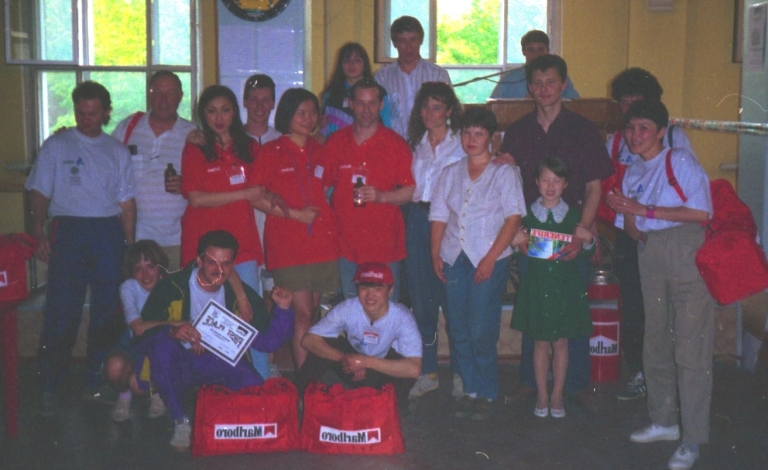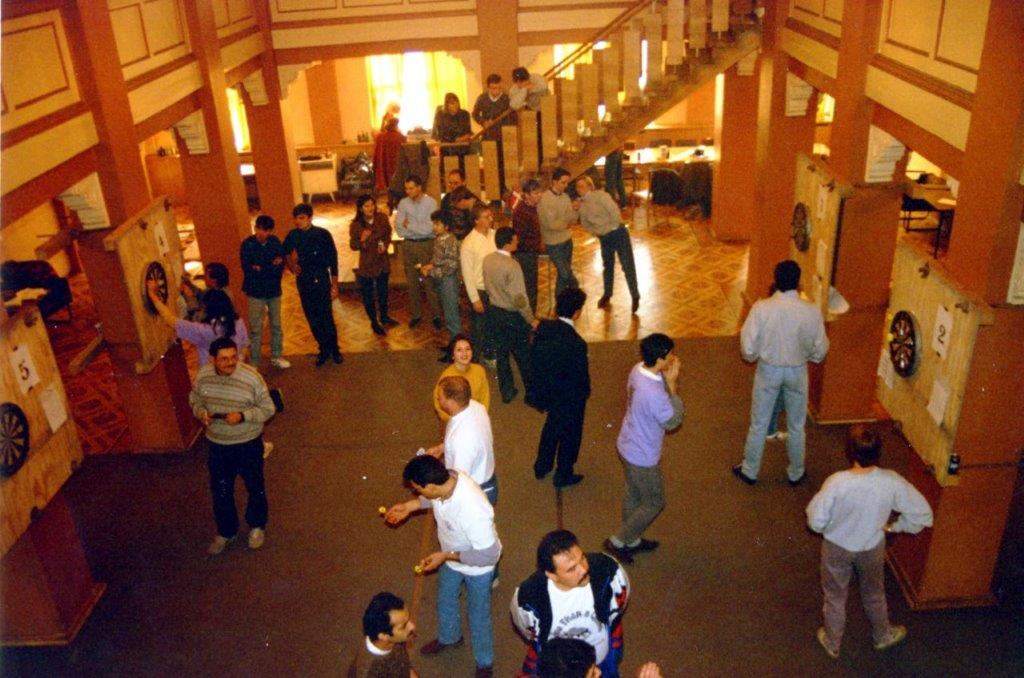There’s a lot of support for sport in Kazakhstan by fans as well as by public and private cash. The hosting of the XXVIII Winter Universiade in 2017 (for student athletes) and the (unsuccessful) bid for the 2022 Winter Olympics signify grand-scale support. But other evidence of commitment to sport abounds. A notable example is Astana Pro Team, the professional road bicycle racing team sponsored by Samruk-Kazyna, i.e., state-owned companies.
My present concern is that I don’t see or hear anything about support for the game of darts. No news. No announcements of competitions. No sponsorships. No foreign trips for the players. Maybe I am just too far away from what is happening on the ground, but it just seems to me that the game of darts deserves some recognition on behalf of those of us who are competitive, like to participate in challenges, but who also don’t go in for physical contact sports or athletics.
The game requires skill and concentration. Practice is not just useful; it is necessary. And as in chess, players sometimes can outpsych their opponents by their words and body language.
Not to be too boastful, I would like to mention here that I personally played a role in supporting a darts team at an international tournament in Almaty.
Some might regard this as rather late news, but I thought that at least some of you might want to know, even 20 years belatedly, that the darts team sponsored by Faegre & Benson law firm won the 2-day International Darts Tournament at KIMEP on Saturday and Sunday, 6 and 7 May 1995. It was a famous victory – even a rout – but only known in a limited circle.
We clearly were the winners of the tournament. Our team had the best male player; we won the men’s singles, the women’s singles, and the women’s doubles; we came second in the men’s doubles; and we won or took second place in a couple of other events.
Our team soundly defeated Kazakhstan’s own national darts team, knocking them out in the final round of the Men’s Singles, the Women’s Doubles, and the Mixed Doubles.

Along the way, we beat Clifford Chance, the only other law firm to sponsor a team, as well as the KPMG team and other teams.

Surprisingly, our group almost missed the tournament for lack of a sponsor willing to pay the entry fee. I had met only two of the six players previously. I thought they were quite good but, well, maybe not outstanding, but I was willing to take the chance with them. Was I ever surprised and pleased. In competition they turned out to be unflinching, sharp-eyed, and with steady hands. Our modest help was much appreciated and seemed to galvanize the team to great effort.

Our team and the name of Faegre & Benson were given prominent mention on the main national television station’s news program, including footage of the team and of me. We expected some newspaper coverage but this was delayed by the fact that our victory occurred on the second day of a 4-day holiday in Kazakhstan.

After the awards presentation, we had a big celebration in the Dostyk Hotel, close by KIMEP. We ate a meal and drank beers for a couple of hours on a hot summer’s evening. Even in Kazakhstan beer drinking is an essential part of darts. Although two weeks earlier I didn’t know most of the players we sponsored, we came away from the event as famous friends, swearing to each other that we would stick together for many tournaments in the future. We didn’t know if this would happen but we all wished so at the time.
In fact, it never happened. Alan Delp’s time as the IT expert at KIMEP came to an end, he married one of the leading ladies on our team, and they went off to America. And so far as I know, no one stepped forward to organize the Second International Darts Tournament. Moral: Not every seed that is planted grows. Events, like institutions, don’t just happen.
The team won about $800, which was a lot considering that the average monthly salary in Kazakhstan in 1995 was on the order of $100. So the team members felt very high. Also, they won a free 8-day stay at a hotel in the Canary Islands but, as they personally would have to pay the airfares, I very much doubt if any of them claimed this prize.
Marlboro was the over-all sponsor of the tournament.
I regret the poor quality of some of the photos. There were no digital cameras in 1995! I regret even more that, despite good efforts, I have been unable to identify some of the people shown. A big thanks to Alan Delp for sharing some of his photos but an even bigger thanks for taking a leading role in that historic event in May 1995!
Oh, I should mention for historical accuracy that it really wasn’t Faegre & Benson that paid the team sponsorship fee. Our office in Almaty was still finding its financial footing and I felt that I couldn’t justify putting up the firm’s money for a sporting event. After all, I didn’t know the team that well, I couldn’t guess their chances for success, and the prospects of gaining a client by being associated with this event seemed very remote. So I dipped into my own pocket. Having done that, it just didn’t seem right to put myself forward as a personal sponsor – ‘The Tom Johnson Darts Team.’ Just didn’t sound right. So it became the Faegre & Benson International Darts Team.

Do you have information about the playing of darts in Kazakhstan today? Fill in some of the missing names? Comments are welcomed! I’d love to find out that the sport is alive and well.
oooOOOooo
Find more stories about Kazakhstan from the 1990s and later in my book, West Meets East in Kazakhstan. It’s available in softcover or e-book format from AuthorHouse (the publisher), or Amazon or Barnes & Noble.
My blog posts go out on Facebook and LinkedIn. If you’d like to see them again or check for posts you might have missed, go to my website: viewkazakhstan.com
